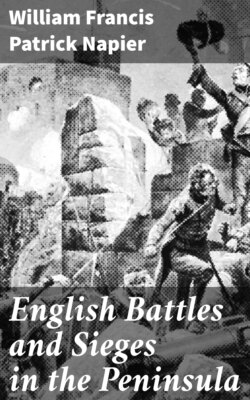Читать книгу English Battles and Sieges in the Peninsula - William Francis Patrick Napier - Страница 11
На сайте Литреса книга снята с продажи.
Combat of Salinas. (July, 1809.)
ОглавлениеTable of Contents
Victor first marched on the Caza de Salinas, a house situated in the plain below. To reach it he had to ford the Alberche and penetrate two miles through the forest, yet the position of McKenzie’s division was indicated by the dust, and as the British cavalry had sent no patrols, the post was surprised. England was then like to have lost her great commander, for Sir Arthur, who was in the house for observation, very hardly escaped capture; for the French charged so hotly that the English brigades were separated, fired on each other, and were driven in disorder through the forest into the open plain. In the midst of this confusion the 45th, a stubborn old regiment, accompanied by some companies of the 60th Riflemen, kept good array, and on them Sir Arthur rallied the others and checked the enemy, covering his retreat with cavalry; yet he lost four hundred men, and the retrograde movement was hastily made in face of both armies.
McKenzie with one brigade now took post behind the Guards in the centre, but Colonel Donkin, seeing the hill on the extreme left unoccupied, crowned it with the other brigade, and thus accidentally filled the position. Meanwhile Victor, issuing from the forest in fine martial order, rapidly crossed the plain, seized another isolated hill, opposite to that held by Donkin, and opened a heavy cannonade: at the same time Sebastiani approached the Spanish line, and pushed forward his light cavalry to make Cuesta show his order of battle; whereupon happened one of those events which show what a chance-medley thing a battle is, even in the hands of a great captain. The French horsemen, riding boldly up, commenced a pistol skirmish, to which the Spaniards replied with one general discharge of musketry, and then ten thousand infantry, with all the artillerymen, as if deprived of their senses, broke and fled away in confused heaps; the gunners carried away their horses, the footmen threw away their arms, the Adjutant-General O’Donoghue was foremost in flight, and even Cuesta went off some distance in his coach: the panic was spreading wide, and the elated horsemen charged down the Royal road, but Sir Arthur instantly flanked them with some English squadrons, the ditches on the opposite side were impracticable, the Spaniards who stood fast began to use their firearms, and those daring troopers had to retreat.
Most of the Spanish runaways made for Oropesa, saying the allies were defeated, the French in hot pursuit. Incredible disorder followed. The English commissaries went off with their animals, the paymasters carried away their money-chests, the baggage was scattered, and the alarm spread along the rear even to the frontier of Portugal. Cuesta indeed, having recovered his presence of mind, sent several thousand horsemen to head the fugitives and drive them back, and some of the artillerymen and horses were thus recovered; many of the infantry also, but in the next day’s battle the Spanish army was less by six thousand fighting men than it should have been, and the great redoubt in the centre was silent for want of guns.
While this disgraceful flight was being perpetrated on the right, the left of the English line displayed the greatest intrepidity. The round hill at the extremity was of easy ascent in rear, but steep and rugged towards the French, and was also protected there by the deep watercourse at the bottom. Nevertheless Victor, seeing Donkin’s brigade was not numerous, and the summit of the hill still naked of troops, thought to seize the latter by a sudden assault.
